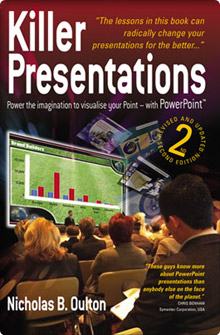Don’t be a Twit
If what you have to say isn’t more beautiful than silence… Shut up. Confuses for Presentations and tweets methinks.
Tweeted 25 Apr 2012
I’ve been looking through my twitter account, which is largely a soliloquy (for an audience of 1.. me) and thought I might occasionally share a collection of related tweets here.. so here is the first collection of 17
Those who think they are good find the need to state it. Those who know don’t.
Advice is cheap But good advice is invaluable (as it is rare.)
What they hear and what you say are not always the same
Win with dignity, Lose with grace
Never underestimate # of people capable of spending 8hr transatlantic reordering bullets\slides & believe they spent the flight working!
Presentations are what happened to the audience, not what was intended by the presenter.
Presentations without structure are not presentations they are ramblings; occasionally interesting often inane always inadvisable!
Simplifying Complexity is genius (& hard); Complicating Simplicity is foolish (& easy); which presenter are you, Wise man or Fool?
Knowing your philosophy is right isn’t important. Knowing it’s wrong is more productive.
Re-ordering slides isn’t presentation preparation, it’s a diversion tactic
If the best thing about your presentation is the design… You’re screwed!
What people feel influences what they do.. Not what they say..
Audiences don’t often care about what you want.
It’s difficult to over prepare for a presentation. But not impossible.
Strive for effective communication not just impressive presentation
Here I tweet, only started, wrote two lines, now departed





